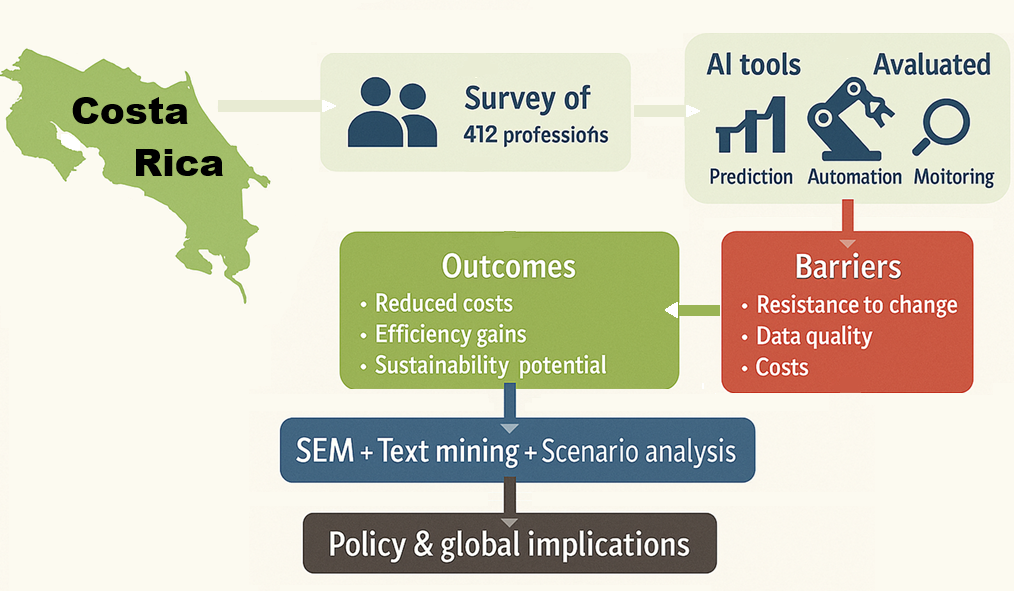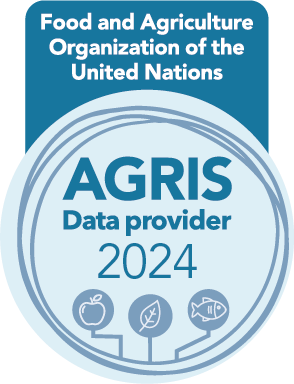The role of artificial intelligence in sustainable agriculture in Costa Rica: An integrated evaluation using structural equation modeling, text mining, and scenario analysis
DOI:
https://doi.org/10.17268/sci.agropecu.2025.036Palabras clave:
Artificial Intelligence (AI), competitiveness, productivity, resource optimization, sustainable agricultureResumen
This study examines the increasing role of artificial intelligence (AI) in Costa Rica’s agricultural sector, emphasizing its potential to enhance sustainability, resource management, and market competitiveness. Using a mixed-methods approach, the research integrates structural equation modeling (SEM), multivariate regression analysis, text mining, and scenario analysis to provide a comprehensive evaluation of AI adoption. AI-driven solutions optimize key agricultural processes, including climate pattern prediction, soil condition monitoring, crop disease detection, and pest management. Quantitative findings indicate a strong correlation between AI adoption and improved productivity, economic benefits, and environmental conservation, particularly through optimized fertilizer and pesticide use and enhanced water management. However, challenges such as high implementation costs, limited digital infrastructure, and farmer resistance remain significant barriers. Text mining analysis reveals widespread concerns over data privacy, technical complexity, and financial investment, highlighting the importance of targeted training programs. Scenario analysis further suggests that government support and technological advancements could significantly accelerate AI adoption over the next decade. The study underscores the need for strategic partnerships among government agencies, educational institutions, and technology providers to bridge the digital divide and encourage AI adoption. These findings not only inform Costa Rican agricultural policy and innovation strategies but also provide a replicable model for other emerging economies aiming to integrate AI sustainably into agricultural systems.
Citas
Ahmad, A., Liew, A. X., Venturini, F., Kalogeras, A., Candiani, A., Di Benedetto, G., ... & Martos, V. (2024). AI can empower agriculture for global food security: challenges and prospects in developing nations. Frontiers in Artificial Intelligence, 7, 1328530. https://doi.org/10.3389/frai.2024.1328530
Alassery, F., Alzahrani, A., Khan, A. I., Irshad, K., & Islam, S. (2022). An artificial intelligence-based solar radiation prophesy model for green energy utilization in energy management system. Sustainable Energy Technologies and Assessments, 52, 102060. https://doi.org/10.1016/j.seta.2022.102060
Ashima, R., Haleem, A., Bahl, S., Javaid, M., Mahla, S. K., & Singh, S. (2021). Automation and manufacturing of smart materials in Additive Manufacturing technologies using Internet of Things towards the adoption of Industry 4.0. Materials Today: Proceedings, 45, 5081-5088. https://doi.org/10.1016/j.matpr.2021.01.583
Autor, D. H. (2019, May). Work of the Past, Work of the Future. In AEA Papers and Proceedings (Vol. 109, pp. 1-32). 2014 Broadway, Suite 305, Nashville, TN 37203: American Economic Association.
Azadi, H., Moghaddam, S. M., Burkart, S., Mahmoudi, H., Van Passel, S., Kurban, A., & Lopez-Carr, D. (2021). Rethinking resilient agriculture: From climate-smart agriculture to vulnerable-smart agriculture. Journal of Cleaner Production, 319, 128602. https://doi.org/10.1016/j.jclepro.2021.128602
Bertoglio, R., Corbo, C., Renga, F. M., & Matteucci, M. (2021). The digital agricultural revolution: a bibliometric analysis literature review. Ieee Access, 9, 134762-134782.
Calicioglu, O., Flammini, A., Bracco, S., Bellù, L., & Sims, R. (2019). The future challenges of food and agriculture: An integrated analysis of trends and solutions. Sustainability, 11(1), 222. https://doi.org/10.3390/su11010222
Chetty, K., Qigui, L., Gcora, N., Josie, J., Wenwei, L., & Fang, C. (2018). Bridging the digital divide: measuring digital literacy. Economics, 12(1), 20180023. https://doi.org/10.5018/economics-ejournal.ja.2018-23
DeLonge, M. S., Miles, A., & Carlisle, L. (2016). Investing in the transition to sustainable agriculture. Environmental Science & Policy, 55, 266-273. https://doi.org/10.1016/j.envsci.2015.09.013
Dop, T. (2020). Hands-On Natural Language Processing with PyTorch 1. x: Build smart, AI-driven linguistic applications using deep learning and NLP techniques. Packt Publishing Ltd.
ElMassah, S., & Mohieldin, M. (2020). Digital transformation and localizing the sustainable development goals (SDGs). Ecological Economics, 169, 106490. https://doi.org/10.1016/j.ecolecon.2019.106490
FAO. 2025. Digital FAO and agro-informatics transformation at scale – End of the year report 2024. Rome.
Galiana, L. I., Gudino, L. C., & González, P. M. (2024). Ethics and artificial intelligence. Revista Clínica Española (English Edition). https://doi.org/10.1016/j.rceng.2024.02.003
George, D., & Mallery, P. (2018). Descriptive statistics. In IBM SPSS Statistics 25 Step by Step (pp. 126-134). Routledge.
Goel, R. K., Yadav, C. S., Vishnoi, S., & Rastogi, R. (2021). Smart agriculture–Urgent need of the day in developing countries. Sustainable Computing: Informatics and Systems, 30, 100512. https://doi.org/10.1016/j.suscom.2021.100512
Hansen, J. W. (2002). Realizing the potential benefits of climate prediction to agriculture: issues, approaches, challenges. Agricultural systems, 74(3), 309-330. https://doi.org/10.1016/S0308-521X(02)00043-4
Hasteer, N., Mallik, A., Nigam, D., Sindhwani, R., & Van Belle, J. P. (2024). Analysis of challenges to implement artificial intelligence technologies in agriculture sector. International Journal of System Assurance Engineering and Management, 15(5), 1841-1860. https://doi.org/10.1007/s13198-023-02164-z
Helsper, E. (2021). The digital disconnect: The social causes and consequences of digital inequalities. Sage Publications.
Jamil, S. (2021). From digital divide to digital inclusion: Challenges for wide-ranging digitalization in Pakistan. Telecommunications Policy, 45(8), 102206. https://doi.org/10.1016/j.telpol.2021.102206
Khatri, P., Kumar, P., Shakya, K. S., Kirlas, M. C., & Tiwari, K. K. (2024). Understanding the intertwined nature of rising multiple risks in modern agriculture and food system. Environment, Development and Sustainability, 26(9), 24107-24150. https://doi.org/10.1007/s10668-023-03638-7
Kim, H., Sefcik, J. S., & Bradway, C. (2017). Characteristics of qualitative descriptive studies: A systematic review. Research in nursing & health, 40(1), 23-42. https://doi.org/10.1002/nur.21768
Lukacz, P. M. (2024). Imaginaries of democratization and the value of open environmental data: Analysis of Microsoft's planetary computer. Big Data & Society, 11(2), 20539517241242448. https://doi.org/10.1177/20539517241242448
Mana, A. A., Allouhi, A., Hamrani, A., Rahman, S., el Jamaoui, I., & Jayachandran, K. (2024). Sustainable AI-Based Production Agriculture: Exploring AI Applications and Implications in Agricultural Practices. Smart Agricultural Technology, 100416. https://doi.org/10.1016/j.atech.2024.100416
Muhie, S. H. (2022). Novel approaches and practices to sustainable agriculture. Journal of Agriculture and Food Research, 10, 100446. https://doi.org/10.1016/j.jafr.2022.100446
Okot, T., & Ojok, B. (2023). Adoption of sustainable agricultural practices (SAPs): A case of coffee farmers in Eastern Uganda. Journal of Rural and Community Development, 18(4).
Okot, T., Madrigal-Mendez, P., & Solorzano-Arias, D. (2023). The internet of things (IoT) for sustainability: A framework for Costa Rica. Journal of technology management & innovation, 18(4), 3-17. http://dx.doi.org/10.4067/S0718-27242023000400003
Parada Gómez, Á. M., Jiménez Ureña, F. (2023). The Competitiveness of Corn Production from a Global Value Chain Approach in the Southern Region of Costa Rica. In: Pérez Akaki, P., Velázquez-Salazar, M., Lizama Gaitán, G.S. (eds) Global Value Chains in Latin America. Sustainable Development Goals Series. Palgrave Macmillan, Cham. https://doi.org/10.1007/978-3-031-33103-9_10
Pereira, A. C., & Romero, F. (2017). A review of the meanings and the implications of the Industry 4.0 concept. Procedia manufacturing, 13, 1206-1214. https://doi.org/10.1016/j.promfg.2017.09.032
Rayna, T., & Striukova, L. (2021). Involving consumers: The role of digital technologies in promoting ‘prosumption’ and user innovation. Journal of the Knowledge Economy, 12, 218-237. https://doi.org/10.1007/s13132-016-0390-8
Shen, J., Hong, T. S., Fan, L., Zhao, R., Mohd Ariffin, M. K. A. B., & As’ arry, A. B. (2024). Development of an Improved GWO Algorithm for Solving Optimal Paths in Complex Vertical Farms with Multi-Robot Multi-Tasking. Agriculture, 14(8), 1372. https://doi.org/10.3390/agriculture14081372
Silva, J. C. F., Machado, K. L. D. G., Silva, A. F. D. S., Dias, R., Bodnar, V. R., Vieira, W. O., ... & Costa, L. C. D. (2025). Challenges and Opportunities for New Frontiers and Technologies to Guarantee Food Production. Sustainability, 17(9), 3792. https://doi.org/10.3390/su17093792
Singh, R., & Dwivedi, G. (2025). Agri-food Supply Chain Management: A Review Using Bibliometric, Network, and Content Analyses. In Operations Research Forum (Vol. 6, No. 2, pp. 1-48). Springer International Publishing. https://doi.org/10.1007/s43069-025-00460-x
Taguchi, N. (2018). Description and explanation of pragmatic development: Quantitative, qualitative, and mixed methods research. System, 75, 23-32. https://doi.org/10.1016/j.system.2018.03.010
Veeramanju, K. T. (2023). Revolutionizing agriculture: a case study of IBM's AI innovations. International Journal of Applied Engineering and Management Letters (IJAEML), 7(4), 95-114. https://doi.org/10.47992/IJAEML.2581.7000.0195
Wessel, L., Baiyere, A., Ologeanu-Taddei, R., Cha, J., & Blegind-Jensen, T. (2021). Unpacking the difference between digital transformation and IT-enabled organizational transformation. Journal of the Association for information systems, 22(1), 102-129. https://doi.org/10.17705/1jais.00655
Zambon, I., Cecchini, M., Egidi, G., Saporito, M. G., & Colantoni, A. (2019). Revolution 4.0: Industry vs. agriculture in a future development for SMEs. Processes, 7(1), 36. https://doi.org/10.3390/pr7010036

Descargas
Publicado
Cómo citar
Número
Sección
Licencia
Derechos de autor 2025 Scientia Agropecuaria

Esta obra está bajo una licencia internacional Creative Commons Atribución-NoComercial 4.0.
Los autores que publican en esta revista aceptan los siguientes términos:
a. Los autores conservan los derechos de autor y conceden a la revista el derecho publicación, simultáneamente licenciada bajo una licencia de Creative Commons que permite a otros compartir el trabajo, pero citando la publicación inicial en esta revista.
b. Los autores pueden celebrar acuerdos contractuales adicionales separados para la distribución no exclusiva de la versión publicada de la obra de la revista (por ejemplo, publicarla en un repositorio institucional o publicarla en un libro), pero citando la publicación inicial en esta revista.
c. Se permite y anima a los autores a publicar su trabajo en línea (por ejemplo, en repositorios institucionales o en su sitio web) antes y durante el proceso de presentación, ya que puede conducir a intercambios productivos, así como una mayor citación del trabajo publicado (ver efecto del acceso abierto).




